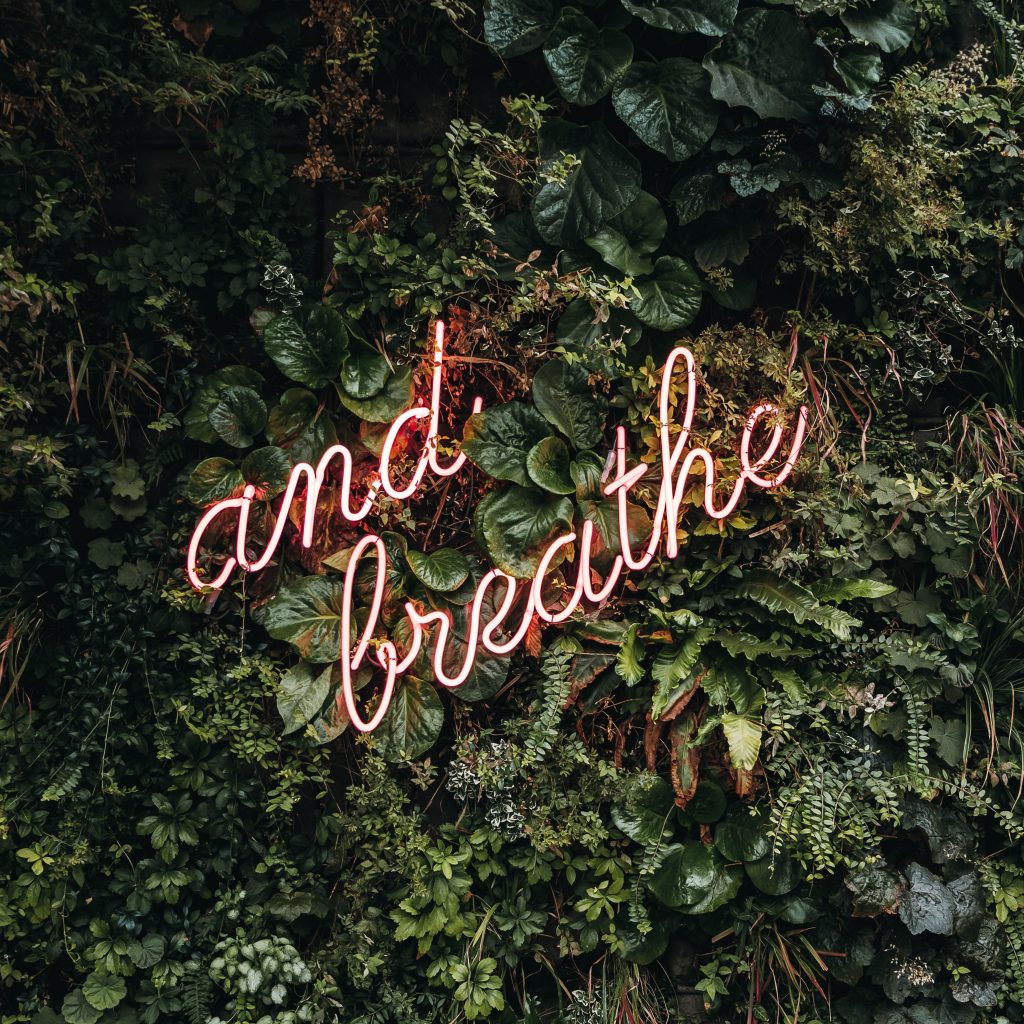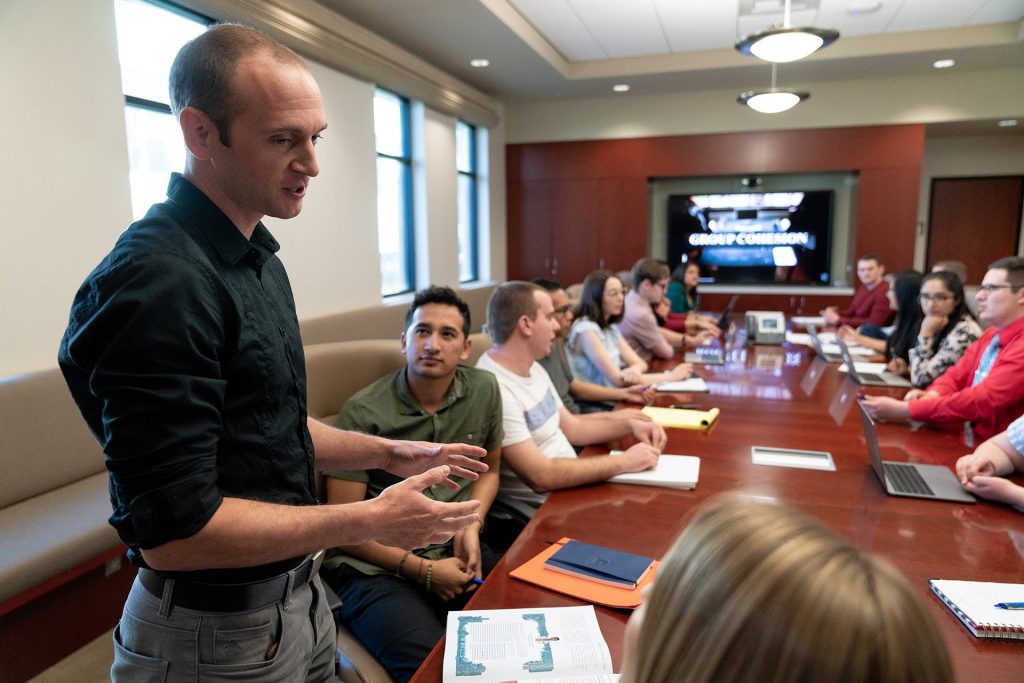Breathe
By Dr. Joshua Fuller

When was the last time you actually thought about taking a breath? As we go about our day, we think about project deadlines, appointments, and who will win the next (American Idol). We think about what we have to do, where we have to go, and with whom we have to meet. Rarely do we give much thought to an essential aspect of life, breathing. Experts say that focused breathing can improve respiratory and cardiovascular function, decrease the effects of stress, and improve physical and mental health (Pal, Velkumary, and Madanmohan, 2004).With the business we all have in our day, who has time to think about breathing? Each day we take about 26,000 breaths, each one just as vital as the next.
Recently, the father of a dear friend of mine passed away. When I went to the funeral, I saw a picture of the man. He wasn’t very old. In fact, he looked healthy, happy, and full of life. He looked about the age of my father, which was possible because my friend and I are the same age. I thought about how quick and delicate life is, and the importance of every moment. Often times I’ve wanted to slow down so that I could enjoy a moment for just a little longer. As it turns out, slowing down breathing can help this desire(Jerath et al., 2006).
When we breathe, our diaphragm contracts expanding our chest cavity. Our intercostal muscles pull our ribs up and outward and our chest cavity is expanded even more. Due to the difference in atmospheric pressure, air rushes in through our mouths/nostrils/trachea/larynx and into our lungs.The lungs capture oxygen and release carbon dioxide, much like an exchanging of goods or a trade. Oxygen rich blood travels throughout the body breathing life into every organ, tissue, and cell.No thought required.This is called metabolic breathing.However, when we are nervous or stressed, our breathing changes and becomes shallow. The shallow breaths don’t give enough time for the oxygen/carbon dioxide exchange(Novotny, S. and Kravitz,L.).We receive less oxygen for our bodies and can’t function optimally.

Have you ever thought about a complex issue or difficult choice and found yourself taking a long deep sigh? Your body desperately wants oxygen in order to perform these difficult cognitive tasks. Taking a deep breath, like before a speech or presentation, is called behavioral breathing. In this way, we can control when and how much we breathe. The physical effects of breathing are most apparent in examples like the Haenyeo of Jeju. With cognitive breathing, women calm themselves to such an extent that they remain underwater for several minutes.
When we are frustrated or stressed, our body responds to our mental state and our breathing follows suit. Our breathing becomes stressed, shallow, and unfulfilling. When we take a moment to breathe, that stress can be reduced. We can breathe it out. Slow breathing resets our neuronal pathways and allows for oxygenated rich blood to circulate through the body efficiently (Jerath et al., 2006).
References: Jerath, R., Edry J.W, Barnes, V.A., and Jerath, V. (2006). Physiology of long pranayamic breathing: Neural respiratory elements may provide a mechanism that explains how slow deep breathing shifts the autonomic nervous system. Medical Hypothesis, 67, 566-571.
Pal, G.K. Velkumary, S. and Madanmohan. (2004). Effect of short-term practice of breathing exercises on autonomic functions in normal human volunteers. Indian Journal of Medical Research, 120, 115-121.
Novotny, S. and Kravitz,L. (n.d.). The Science of Breathing.Retrieved from http://www.unm.edu/~lkravitz/Article%20folder/Breathing.html
What are your thoughts? Share below-CBU student comments left within a week of the publication of this blog will be entered into a raffle for a CSHB external battery to keep your phone charged when you are on the go. Winners notified via email.

23 Comments
I noticed myself taking several deep breaths while reading this article!
Sighing seems to be associated with a depressive image telling that something is not going well. However the article made me think that it is rather a positive reaction that prepares me to cope with the difficulties I encounter with. Next time I sigh, it will remind me of this article and help me to become more positive!
I found this topic captivating because breathing, though essential and consistent, is an automatic process, that many of us take for granted. As a vocalist and former dancer, there have been moments in my life where breathing required control and training. In dance, especially contemporary styles, a breath at the wrong moment can make certain motions more difficult or convey the wrong message. In a group of dancers, the motions must look fluid and unified, which includes breathing. Similarly, in choral groups and even solos, breathing at the wrong moment may mean that you run out of breath when the note is supposed to be held out, or the wrong note is sung. This arguably requires more precision and planning than dance.
This post captured my attention because the activities I am most passionate for are grounded in breath. It was interesting to read about the way that our body and breath respond to our mental state, which is why it takes mental preparation before a big solo or an athletic event. Dedicated preparation and confidence in the abilities that you have, are what I believe ultimately lead to a good performance.
Thank you for the interesting read!
I loved this topic because I can relate to it so deeply. Something that a lot of my friends, family, co-workers and colleagues tell me is that I need to slow down. For me that is a difficult task to grab onto because the meaning escapes me. But this puts it into a very literal and biological perspective that sometimes you really do need to just take a moment and breathe because in the long run all it can do is benefit you. Taking just a second to come back to reality and treat your body the way that it is meant to be treated with genuine breath really can benefit you. Thank you Dr. Fuller for reminding us that the little things in life are actually a lot bigger than we acknowledge.
This post relates to me in so many ways. My life has been incredibly hectic and stressful as of late and taking a step back to breathe and reflect might be what I am missing. I am known to overdo things. Sometimes its working too much, stressing too much over school, or pursuing many different hobbies that peak my interest. At the end of the day I am exhausted and wonder where the day went. Quite often I find myself saying that there simply is not enough hours in the day to accomplish all that i what/need to do. Taking the time to breathe, relax, and reflect on my life could be valuable for me, slowing down the pace and thinking about what I can do to be content.
Dr. Fuller, I enjoyed reading about this topic because I have recently begun looking into practicing a more mindful lifestyle. I never realized how much I just go through every day just as another day until I started reading about practicing mindful living. The topic of breathing ties in to being mindful because being aware of our surroundings and being purposeful with each breath we take helps in this practice. By focusing on our breath, we can center ourselves and control the way in which we feel in certain circumstances. Breathing is such a subconscious idea to us that we totally forget about it. Just as your post said that we take 26,000 breaths a day. The more we can focus on each breath the calmer and more centered we can make ourselves feel.
Dr. Fuller thanks for providing insight on the art of breathing. Cognitive and behavioral breathing are practical ways for individuals to release stress and focus better. People who meditate regularly have been found to have lower stress levels than people who do not meditate on a regular basis.
Its so crazy to think we are such complex creatures we take for granted such a simple thing as breathing! Its so simple we don’t even take time to stop and think about it. I also really enjoyed learning about behavioral breathing. I have used breathing as a coping technique and a way to soothe myself and I never stop to question it.
Throughout the blog post I caught myself taking deeper and slower breathes as if I was breathing in the words written ! In yoga steady breathing is used to help create transformation in the body and mind. While it makes perfect sense in yoga, I never stopped to think that taking a deep breath during everyday stressors could hold such significance. Reading this article was a friendly reminder that even as complex as we are, as human its so important to take a moment and think about how one deep breath is all we need to really shift our thoughts and reset.
I found this topic much more relatable than I had originally thought. Breathing, something so simple, that we probably do not think about very often. It was not until recently that I found myself having to focus on my breathing. Especially in times of stress or anxiety, I began to notice that my breathing was very short. In times of so much uncertainty, it is so important to just take a step back and breathe, even mores when we cannot control the circumstance. Not only does this blog explain stress and anxiety in breathing, but it also shows the biological importance for your body and health to breathe. This aspect is one that I have never looked into. Of course, our bodies need oxygen, we need to breathe. Another aspect that I found very interesting was that of sighing, or taking a long breath before a difficult task. I had never thought of it in a positive way, but more of a lazy reaction.
With this season of uncertainty, I will definitely take the time to focus more on breathing, and realize that it is a great way to relax my body and focus myself. Thank you so much for this post, and reminding us of the simple things in life and how they play a major role, even when we are not aware of it.
It is amazing that there is such a strong link between our mental state and breathing. This is despite me regularly practicing breathing exercises. I personally practice these as a method for stress-management. Though, I always saw these exercises as a way to take a break from whatever task I was stressed over. Though, now I see that these breathing exercises were not only me taking a break, they were also my brain simply getting the oxygen it needed!
Dr. Fuller, this post was something I truly needed. I realized that breathing is an important thing that we need to do and do it everyday but actually taking time to breathe when stressed or overwhelmed is something we rarely do. I think it is cool that the apple watch has that feature called the “breathing” app. I’m going to start using that and when I feel stressed I am going to take advantage of that feature.
Thank you for sharing this!
The message you mentioned is very powerful and important. There are many moments in my life where I just forget to simply take a deep breath. As you mentioned, there are different forms of taking breaths. When life is stressful, taking deep breaths is different. It feels forced and uninviting. During moments of stress, my breathing feels out of control and I lose focus. Finding that moment to simply breathe and relax is important. A small task with a largely positive outcome.
I really loved this topic and can relate so much to it because I feel like we take breathing for granted because our body automatically does. We are always telling someone to take deep breaths whether they are having a panic attack or giving birth. It is the first thing you do when enter the world and the last thing you do as you leave it as well. I am always reminding myself to breathe because I feel like I forget to breathe sometimes especially when I am stressed or anxious about something. I try to take a step back every once in a while and try to breathe deeply to calm myself down. Thank you for the insightful post and reminder to breathe!
It is so easy to be consumed with day-to-day activities that something as natural as breathing is constantly overlooked. I recently went to Laguna Beach on a whale watching activity for my nephew’s birthday. I had not visited the beach in a little over a year. I found myself at such peace, experiencing exactly what you described with slow breathing. In today’s lecture for psychophysiology, we learned about managing and stress and were introduced to stress relief strategies. Breathing techniques were one of the first things mentioned and a technique growing in popularity in the field of counseling. As a person trying to practice mindfulness and managing stress breathing techniques is something I plan to implement in my life.
So good, Selenne! I love the phrase of a worship song that sings, “it’s your breath, in my lungs, so I’ll pour out my praise to You only”. I will sometimes meditate on this truth when I pause and think on my own breathing. Even a simple breath is an experience with our Divine, Good God.
Dr. Fuller,
I really enjoyed your insights about breathing. It reminds me of how every day things, such as breathing, is vital to life and so intelligently and specifically designed. Adam’s life in the Garden of Eden started with breath and his death, along with ours ceases our breath. As time continues on, I agree that sometimes we need to breathe, let our body function as it was designed to, and enjoy the moments of life.
I really enjoyed reading this since it shows us that we should just breathe sometimes since it helps calm ourselves down and I definitely try it when I try to ease some stress and enjoy the life we have now.
Dr. Fuller thank you for providing us with informative information about breathing. Breathing is something many of us take for granted and don’t realize it until it’s too late. I think its pretty cool how a device such as a watch keeps track of once breathing and reminds them to do so.
This article caught my attention because for a while I was honestly frustrated with how often one specific friend of mine would remind to breathe. As I vented or was frustrated, etc., he would tell me to take slow deep breaths and even though I never expressed it to him, it was all in my head. How come that is his first response.
The manner in which you expressed the breathing process not only physically throughout our bodies but within our minds, was so insightful. I knew that breathing could be of help, but I never went out of my way to research in just what specific ways.
Behavioral breathing was a concept I had never heard of, so I am glad I learned something new. It will definitely be something for me to do more research on.
Thank you for reading Jennifer!
This is such an interesting post! Ironically, while reading, I did nothing but focus on my breath. This made me think about how often I sit back and actually become present. Unfortunately, due to the stressors of school, it is a rarity when I can do something as simple as focus on my breathing. Even though breathing is an inextricable element of human life, we often take it for granted. It is almost like we don’t know what we have until it’s gone. This post made me focus on the important things in life, lightening my workload, and my breathing; all of which are the key to staying present.
Aniyah thank you for sharing! It really is amazing that when we concentrate on the simple but complex things like breathing we can become more mindful about how beautiful it is.
This was such a relaxing article to read! As a first time stay at home mom, and a full time student, I feel as if my mind is constantly moving. I am constantly thinking of when my next assignment is due, when I need to cook, clean, but I never truly stop and take a breath. At times, I feel so overwhelmed and overworked I feel like I can barely get anything done, I am so hard on myself. This post really made me realize that at times it’s ok to sit down, relax, and breathe. It is amazing how something so simple can be forgotten.
Thank you for sharing, Julissa! You have a lot on your plate, breathing and resting is good and so needed and yes it is more than okay! I hope you can have intentional time to just sit and breathe.